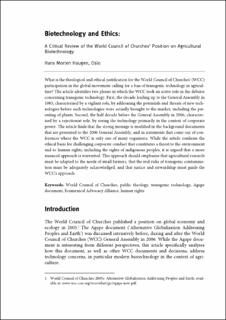| dc.contributor.author | Haugen, Hans Morten | |
| dc.date.accessioned | 2024-04-18T13:10:26Z | |
| dc.date.available | 2024-04-18T13:10:26Z | |
| dc.date.created | 2011-05-10T14:30:33Z | |
| dc.date.issued | 2011 | |
| dc.identifier.citation | Diaconia. Journal for the Study of Christian Social Practice. 2011, 2 (1), 30-50. | en_US |
| dc.identifier.issn | 1869-3261 | |
| dc.identifier.uri | https://hdl.handle.net/11250/3127317 | |
| dc.description | Open access publication licensed under a CC-BY-NC-ND 4.0 International License | en_US |
| dc.description.abstract | What is the theological and ethical justification for the World Council of Churches' (WCC) participation in the global movement calling for a ban of transgenic technology in agriculture? The article identifies two phases in which the WCC took an active role in the debates concerning transgenic technology. First, the decade leading up to the General Assembly in 1983, characterised by a vigilant role, by addressing the potentials and threats of new technologies before such technologies were actually brought to the market, including the patenting of plants. Second, the half decade before the General Assembly in 2006, characterised by a rejectionist role, by seeing the technology primarily in the context of corporate power. The article finds that the strong message is modified in the background documents that are presented to the 2006 General Assembly, and in statements that come out of conferences where the WCC is only one of many organisers. While the article confirms the ethical basis for challenging corporate conduct that constitutes a threat to the environment and to human rights, including the rights of indigenous peoples, it is argued that a more nuanced approach is warranted. This approach should emphasise that agricultural research must be adapted to the needs of small farmers, that the real risks of transgenic contamination must be adequately acknowledged, and that justice and stewardship must guide the WCC's approach. | en_US |
| dc.language.iso | eng | en_US |
| dc.publisher | Vandenhoeck & Ruprecht | en_US |
| dc.relation.uri | http://idtjeneste.nb.no/URN:NBN:no-bibsys_brage_27596 | |
| dc.rights | Attribution-NonCommercial-NoDerivatives 4.0 Internasjonal | * |
| dc.rights.uri | http://creativecommons.org/licenses/by-nc-nd/4.0/deed.no | * |
| dc.subject | human rights | en_US |
| dc.subject | Ecumenical Advocacy Alliance | en_US |
| dc.subject | Agape document | en_US |
| dc.subject | transgenic technology | en_US |
| dc.subject | public theology | en_US |
| dc.subject | World Council of Churches | en_US |
| dc.title | Biotechnology and ethics: A critical review of the world council of churches’ position on agricultural biotechnology | en_US |
| dc.type | Peer reviewed | en_US |
| dc.type | Journal article | en_US |
| dc.description.version | publishedVersion | en_US |
| dc.rights.holder | © 2011 Vandenhoeck & Ruprecht | en_US |
| dc.source.pagenumber | 30-50 | en_US |
| dc.source.volume | 2 | en_US |
| dc.source.journal | Diaconia. Journal for the Study of Christian Social Practice | en_US |
| dc.source.issue | 1 | en_US |
| dc.identifier.doi | 10.13109/diac.2011.2.1.29 | |
| dc.identifier.cristin | 804562 | |
| cristin.ispublished | true | |
| cristin.fulltext | original | |
| cristin.qualitycode | 1 | |

